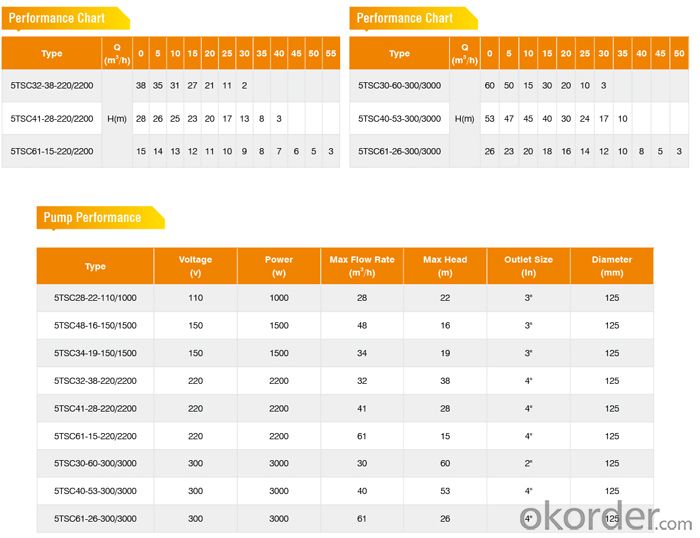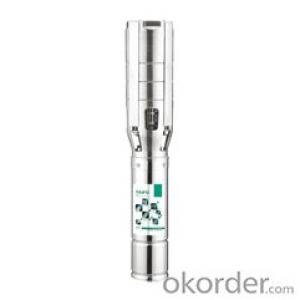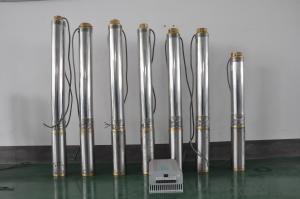5TSC SOLAR PUMP stainless steel CE, solar panel
- Loading Port:
- Shanghai
- Payment Terms:
- TT OR LC
- Min Order Qty:
- 50 pc
- Supply Capability:
- 100000 pc/month
OKorder Service Pledge
OKorder Financial Service
You Might Also Like
1.APPLICATION AREA:This project products are mainly used in dry region for irrigation of agriculture, It can be used for drinking water and
living water. The living condition could be much improved. It also can be used for fountains.2.MATERIAL OF PARTS:Outlet: stainless steel
Pump body: stainless steel
Motor body: stainless steel
Bearing: C&U
3.ADVANCED TECHNOLOGY:1.Application innovation
Compared with the traditional alternating current machine, the efficiency is improved 25% by the permanent magnetism, direct current, brushless, non-sensor motor.
2.Technics innovation
Adopt double plastic package for rotor and stator, motor insulation≥300MΩ, the motor security was much improved.
3.Structure innovation
Oil filling, convenient installation and environmental protection4.HIGHLIGHTSa.Energy-saving and environment-protected green products
b.High technique products adopting MPPT and DSP chip technique.
c.100% copper wire, cold-rolled silicon steel sheet
d.CE certificate
e.Advanced three phase brushless DC motor
f.Stainless steel 316 screws
g.3 years warranty5.PRINCIPLE OF OPERATION:Solar panel collects sunlight→DC electricity energy → solar controller(rectification,stabilization,amplification,filtering)→available DC electricity→(charge the batteries)→pumping water6.ADVANTAGES OF SOLAR PUMP SYSTEM:A.It is easier and more widely used than any other dynamoelectric driven pumps.
B.It is more economical and more environmentally friendly.7.MODEL SELECTION:a.The power of solar panel = power of pump ×1.3
The voltage of solar panel = the voltage of pump
The controller should be matched
b.Select the batteries according to the following formulas:
The use hour of battery =
The battery capacity ÷(the machine power÷the battery voltage)×0.6 For example,the machine power is 200W, the battery
capacity is 100AH,the voltage is 12V,and the battery is fully charged,then the use hour is:100÷(200÷12)×0.6=3.6hours
c.The battery capacity=
the use hour ÷0.6×(the machine power÷the battery voltage) For example,the machine power is 200W,the battery voltage
is 12V,and the battery need to be used for 3.6hours,then the battery capacity is:3.6÷0.6×(200÷12)=100AH


- Q:Do solar pumps require batteries for storage?
- No, solar pumps do not require batteries for storage as they directly use solar energy to operate.
- Q:What is the lifespan of a solar pump's solar panels?
- The lifespan of a solar pump's solar panels can vary depending on various factors such as the quality of the panels, maintenance, and environmental conditions. However, on average, solar panels used in solar pumps have a lifespan of around 25 to 30 years.
- Q:Can a solar pump be used in areas with strict emissions regulations?
- Yes, a solar pump can be used in areas with strict emissions regulations. Solar pumps are powered by solar energy and do not emit any greenhouse gases or pollutants during operation, making them an environmentally friendly option that complies with strict emissions regulations.
- Q:Can a solar pump be used for water supply in agricultural or farming operations?
- Yes, a solar pump can be used for water supply in agricultural or farming operations. Solar pumps are an environmentally friendly and cost-effective solution for pumping water in remote areas where grid electricity is not available. They can be used for various agricultural activities such as irrigation, livestock watering, and crop spraying, helping farmers reduce their dependence on traditional energy sources and improve overall efficiency. Additionally, solar pumps can harness renewable energy from the sun, making them a sustainable choice for water supply in agricultural or farming operations.
- Q:Can a solar pump be used for water supply in community gardens or urban farming projects?
- Yes, a solar pump can be used for water supply in community gardens or urban farming projects. Solar pumps are a sustainable and environmentally friendly solution as they utilize the energy from the sun to pump water. They are ideal for remote locations with limited access to electricity and can efficiently provide water for irrigation and other agricultural needs. Additionally, solar pumps require minimal maintenance and operating costs, making them a practical choice for community gardens and urban farming projects.
- Q:What is the maximum temperature a solar pump can withstand?
- The maximum temperature a solar pump can withstand varies depending on the specific model and manufacturer. However, typically, solar pumps can withstand temperatures ranging from -40°C to 60°C or even higher in some cases. It is always advisable to refer to the manufacturer's specifications for the exact maximum temperature limit of a particular solar pump model.
- Q:How does a solar pump help in reducing the use of irrigation water?
- A solar pump helps in reducing the use of irrigation water by utilizing solar energy to power the pump, which eliminates the need for grid electricity or fuel. This means that farmers can pump water from a sustainable source, such as a well or river, without relying on limited water resources. By using a solar pump, farmers can efficiently water their crops while minimizing water wastage, leading to a significant reduction in the overall use of irrigation water.
- Q:What is the payback period for a solar pump investment?
- The payback period for a solar pump investment is the amount of time it takes for the initial investment to be fully recovered through energy savings and other financial benefits. It is a crucial metric for evaluating the financial viability of such an investment. The actual payback period for a solar pump investment can vary depending on various factors such as the cost of the equipment, installation expenses, energy tariffs, and maintenance costs. Additionally, the amount of energy generated by the solar pump and the price of alternative energy sources in the region also play a significant role in determining the payback period. Typically, solar pump investments have relatively shorter payback periods compared to traditional pump systems powered by non-renewable energy sources. This is due to the lower operating costs associated with solar power, as sunlight is a free and abundant resource. Moreover, solar pumps require minimal maintenance and have a longer lifespan, reducing overall operational expenses. On average, the payback period for a solar pump investment ranges from 2 to 5 years. However, in some cases, it can be as short as 1 year or as long as 7 years, depending on the aforementioned factors. It is important to conduct a thorough financial analysis considering these variables to determine the specific payback period for a solar pump investment. Despite the initial capital required, a shorter payback period indicates a more financially attractive investment. Once the payback period is achieved, the solar pump investment will continue to generate energy savings and financial benefits for an extended period, contributing to long-term cost reductions and environmental sustainability.
- Q:Can a solar pump be used in greenhouses?
- Indeed, greenhouses can make use of solar pumps. Solar pumps prove to be an excellent choice for irrigation systems in greenhouses due to their reliance on renewable and eco-friendly solar energy. Their purpose extends beyond efficiently watering plants, as they are also able to supply nutrients and uphold ideal moisture levels within the greenhouse. By eliminating the necessity for electricity or fuel, solar pumps effectively curtail greenhouse gas emissions and lower operational expenses. Furthermore, their seamless integration into existing greenhouse systems renders them a viable and pragmatic solution for sustainable agriculture.
- Q:How much maintenance does a solar pump require?
- A solar pump typically requires minimal maintenance. Regular cleaning of the solar panels and checking the pump's performance and connections are usually sufficient to keep it running efficiently.
1. Manufacturer Overview |
|
|---|---|
| Location | |
| Year Established | |
| Annual Output Value | |
| Main Markets | |
| Company Certifications | |
2. Manufacturer Certificates |
|
|---|---|
| a) Certification Name | |
| Range | |
| Reference | |
| Validity Period | |
3. Manufacturer Capability |
|
|---|---|
| a)Trade Capacity | |
| Nearest Port | |
| Export Percentage | |
| No.of Employees in Trade Department | |
| Language Spoken: | |
| b)Factory Information | |
| Factory Size: | |
| No. of Production Lines | |
| Contract Manufacturing | |
| Product Price Range | |
Send your message to us
5TSC SOLAR PUMP stainless steel CE, solar panel
- Loading Port:
- Shanghai
- Payment Terms:
- TT OR LC
- Min Order Qty:
- 50 pc
- Supply Capability:
- 100000 pc/month
OKorder Service Pledge
OKorder Financial Service
Similar products
New products
Hot products
Related keywords




























